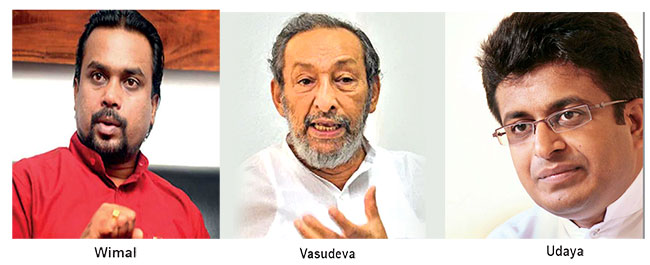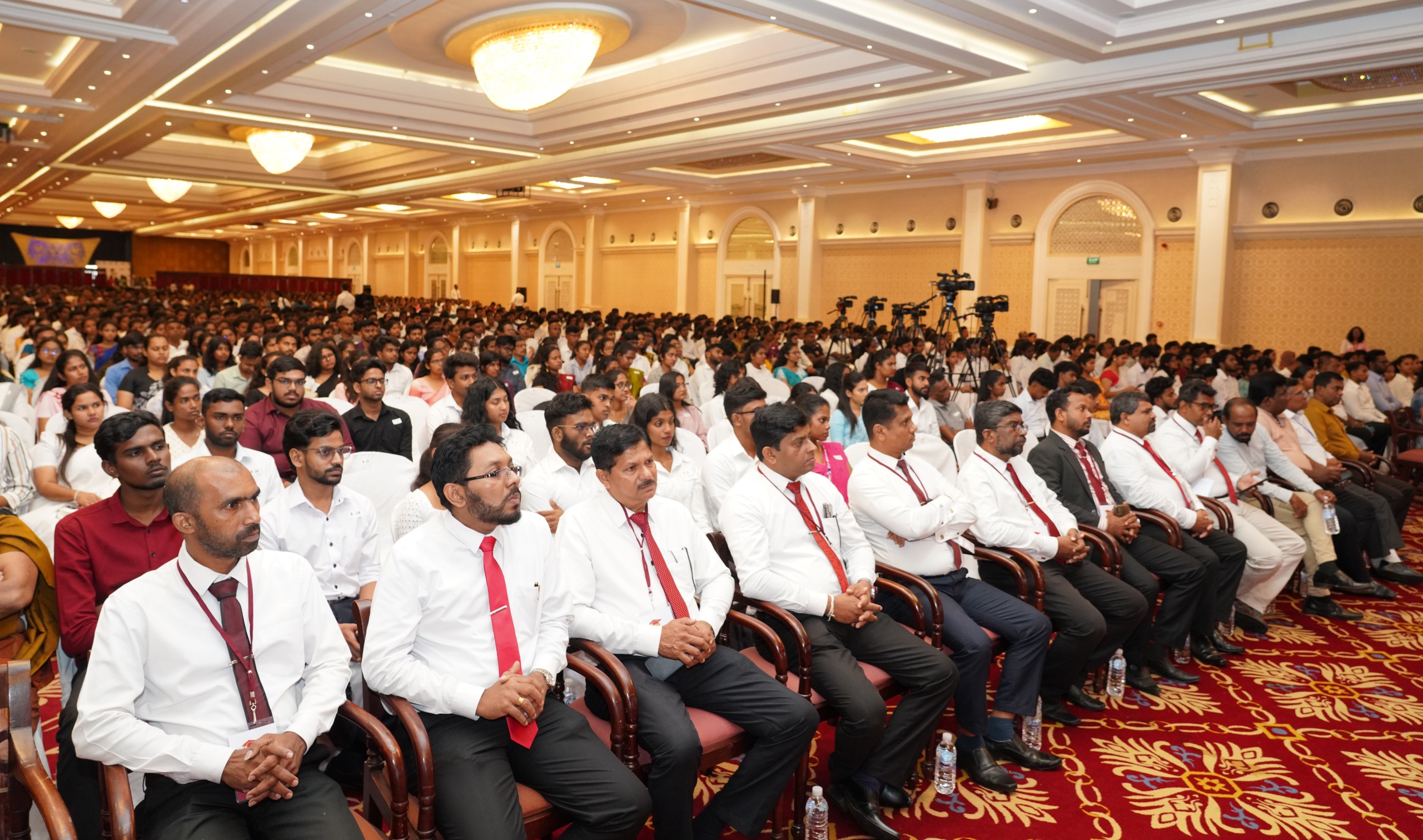News
New Fortress deal: Three Cabinet Ministers back petitions against govt., make history

By A.J.A. Abeynayaka
Cabinet ministers Vasudeva Nanayakkara, Wimal Weerawansa and Udaya Gammanpila yesterday (07) made representations to the Supreme Court in support of the fundamental rights cases filed against the transfer of 40 per cent of government shares of the Yugadanavi Power Station to US-based New Fortress Energy.
They threw their weight behind the petitions, although they have been named respondents as members of the Cabinet.
Attorney-at-law Nilanthi Wijesinghe on behalf New Democratic Front (NDF) General Secretary Nanayakkara, National Freedom Front (NFF)) leader Weerawansa and Pivuthuru Hela Urumaya leader Gammanpila submitted a 58-page report against the agreement between the government and the New Fortress Energy. The report alleges that Finance Minister Basil Rajapaksa hadn’t submitted a Cabinet memorandum and no discussion took place at the Cabinet. The ministers have also alleged that the agreement was reached in violation of the tender process that had gone underway by that time.
The three ministers have said that the company in question launched in 2018 and lacked expertise in the management of LNG handling at the Yugadanavi power plant and therefore posed a threat to Sri Lanka’s security.
There hasn’t been a previous instance of members of Cabinet moving court against a Cabinet decision.
Among those who have filed fundamental rights petitions are Archbishop of Colombo Malcolm Cardinal Ranjith, Ven. Elle Gunawansa, the JVP and the SJB.
News
National Assessment and Policy Review: The impact of social media on children

Deputy Minister of Digital Economy, Eranga Weeraratne, stated that the Ministry of Education, the Ministry of Women and Child Affairs and the Ministry of Digital Economy are planning to initiate a national assessment and policy review on the impact of social media on children.
The Deputy Minister emphasized that the initiative is expected to be advanced by giving due consideration to the insights of experts across all relevant fields, including child protection, education, health, mental health, cyber security, law and research, as well as by listening to the voices of civil society and youth.
Full statement made by Deputy Minister, Eranga Weeraratne.
“Many parents in Sri Lanka today face the challenge of understanding the impact of social media on their children and determining what measures they should take to ensure their safety. The solution is not to restrict children’s access to technology. Social media offers numerous benefits, including educational opportunities, the development of creative skills and improved communication. However, there is also a reality we must acknowledge. The online environment can often be unsafe, overwhelming and psychologically stressful for children. The resulting harm can negatively affect a child’s sleep, education, friendships and overall mental well-being. In some cases, excessive engagement with social media becomes difficult to control. Attempts to prevent such overuse may sometimes lead to conflicts, anger, or harsh disciplinary measures, which further impact learning and mental health. Consequently, children may experience stress, diminished self-confidence and emotional distress.
Online cyber bullying is another major concern. Additionally, children are often exposed to age-inappropriate content, including violent, sexual, or otherwise harmful material. There have been cases where children repeatedly engage with such harmful content, becoming increasingly absorbed in it. Some online games also present situations that encourage children to engage in disruptive or unsafe behaviour.
In extreme cases, such engagement has even led children to put their lives at risk. For this reason, ensuring the online safety of children has become a national priority in many countries. Our approach, likewise, must be guided by three fundamental principles.
First, the safety of children is paramount. This remains a non-negotiable policy of the government. Second, our actions must be based on evidence and research. We never proceed based on assumptions. Third, while safeguarding rights and privacy, our goal is to minimize excessive surveillance. Striking a balance between rights, safety and innovation is our primary objective.
Many countries around the world are already taking measures in this regard. It has become a timely necessity for us to carefully study these experiences, adapt them to our context and develop a comprehensive programme to protect our children. As a first step, we hope to initiate a national assessment and policy review on the impact of social media on children, in consultation with the Ministry of Education and the Ministry of Women and Child Affairs.”
Experts in fields such as child protection, education, health, mental health, cyber security, law and research, along with the voices of civil society and youth, must be engaged in this effort. This is not a challenge that the government can address alone. Parents, teachers and children themselves all need to participate collaboratively. Through this approach, we can create an environment where our children can make full use of technology safely and responsibly.
News
Public officials must clearly understand public expectations against corruption and fraud – Secretary to the President

In line with the Government’s programme to build a clean, transparent and corruption-free public service, a workshop to brief heads of 250 state institutions that have been instructed to establish Internal Affairs Units was held on Thursday (29) at the auditorium of the Sri Lanka Foundation Institute, under the patronage of Secretary to the President, Dr. Nandika Sanath Kumanayake.
As the first phase of this programme, Internal Affairs Units were previously established in 106 state institutions and the relevant officers were trained accordingly. As part of the second phase, instructions have been issued to establish Internal Affairs Units in an additional 250 state institutions. Accordingly, this workshop was organised by Presidential Secretariat, with the assistance of the Clean Sri Lanka Programme.
Although Sri Lanka continues to maintain relatively high rankings in sectors such as education and healthcare, Secretary to the President, Dr. Nandika Sanath Kumanayake noted that the country is ranked 121st in the 2024 Corruption Perceptions Index, a position that could adversely affect its overall standing in other key sectors.
Addressing the gathering, the Secretary to the President stated that while the primary slogan of the recent public uprising was against the corrupt politics, the allegations were directed not only at corrupt politicians but also at corrupt public officials. He emphasised that the public uprising occurred at a time when the country had become economically bankrupt and its adverse consequences were being directly felt by the people.
He further observed that such public uprisings are not sudden events, but rather the culmination of a prolonged and systematic process, driven by public frustration and the erosion of trust in governance.
Further addressing the workshop, Secretary to the President emphasised that public uprisings should not be underestimated, noting that they represent a powerful expression of public will.
He stated that it is essential for public officials, as well as politicians, to have a clear understanding of public aspirations and public sentiment. As public servants, he stressed, there is an obligation to deliver a clean, transparent and accountable public service to the people.
Accordingly, he explained that a structured programme has been initiated to strengthen the integrity of public service delivery. The establishment of Internal Affairs Units forms a key component of this initiative, aimed at ensuring greater transparency and accountability within state institutions.
Dr. Kumanayake further noted that public officials must remain mindful of upholding ethical standards while performing their duties, as strengthening individual integrity can contribute to transforming the broader culture of corruption within the public sector.
He highlighted that Internal Affairs Units can be viewed both as a mechanism for fostering a culture of integrity within the public service and as a platform that enables the public to raise concerns regarding the conduct of public officials, thereby strengthening accountability and public trust.
At the event, Additional Secretary to the President, Ms. Chandima Wickramasinghe and Senior Lecturer at the University of Kelaniya, Tharindu Dhananjaya Weerasinghe delivered keynote presentations.
Latest News
In order to safeguard the future of the country, a quality human resource must be developed. – Prime Minister

Prime Minister Dr. Harini Amarasuriya stated that in order to ensure the economic, social, and cultural security of the country, it is essential to develop a quality human resource, and that education plays a vital role in achieving this goal.
The Prime Minister emphasized that the government is committed to bring about a transformation in the education sector, and that the government will continue to move forward by overcoming obstacles encountered along the way, guided by a clear vision and purpose.
The Prime Minister made these remarks while addressing the EDCS Sisu Nena Pranama scholarship award ceremony held on Saturday (31) at Temple Trees, organized to recognize the children of the members of the Education Co-operative Society (EDCS) who have been selected to state universities for the academic year2023/2024.
Elaborating further, the Prime Minister noted that this program, organized by the Education Service Employees– Co-operative Thrift and Credit Society Ltd, is not merely about providing scholarships, but is an occasion that recognizes and appreciates the dedication of students and their parents who are preparing to shoulder the responsibility of the country’s future.
The Prime Minister also pointed out that it is a remarkable achievement that a society which began in 1930 with just 58 members and a membership fee of one rupee has today grown into the largest cooperative society in South Asia, with approximately 215,000 members.
The Prime Minister further highlighted how rapidly the world is changing, and the increasing necessity of developing human resources in the face of economic and environmental crises. She stressed that the education system must be transformed from the level of school education itself to align with the demands of the modern world, and that students entering universities should become leaders and active participants in this transformation.
Noting that out of nearly 300,000 students who enter primary education each year, only about 40,000 gain admission to universities, the Prime Minister urged students to make use of this opportunity for the development of the country.
Addressing the occasion, Deputy Minister of Labour and General Secretary of Ceylon Teachers Service Union, Mahinda Jayasinghe, stated that due to corruption-free management, it was possible to increase the financial stability of the society from Rs. 1,200 million to Rs. 1,700 million within a short period of approximately nine months.
Under this year’s program, scholarships amount to over Rs. 13.7 million were awarded to 2,292 students who have been selected to state universities.
This scholarship program, which initiated in 1984 with 15 students and an initial fund of Rs. 3,500, has been conducted continuously for 41 years. At present, scholarships of up to a maximum of Rs. 75,000 per student are awarded, demonstrating the collective strength and solidarity of the teaching community.
The event was attended by the Chairman of the Education Development Cooperative Society, Lal Kumara, the Western Province Director of Education, Darshani Iddamalgoda, along with other officials.

[Prime Minister’s Media Division]
-

 Business6 days ago
Business6 days agoComBank, UnionPay launch SplendorPlus Card for travelers to China
-

 Business3 days ago
Business3 days agoClimate risks, poverty, and recovery financing in focus at CEPA policy panel
-

 Opinion2 days ago
Opinion2 days agoSri Lanka, the Stars,and statesmen
-

 Business1 day ago
Business1 day agoHayleys Mobility ushering in a new era of premium sustainable mobility
-

 Opinion6 days ago
Opinion6 days agoLuck knocks at your door every day
-

 Business1 day ago
Business1 day agoAdvice Lab unveils new 13,000+ sqft office, marking major expansion in financial services BPO to Australia
-

 Business1 day ago
Business1 day agoArpico NextGen Mattress gains recognition for innovation
-

 Editorial1 day ago
Editorial1 day agoGovt. provoking TUs













